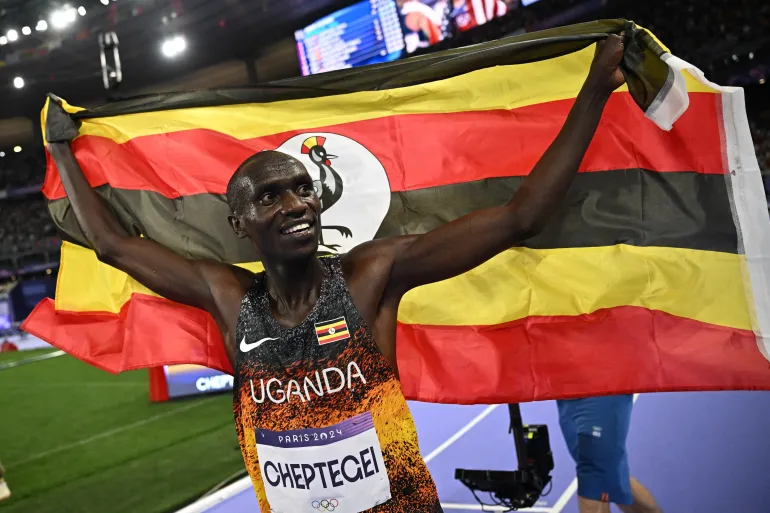Uganda’s renowned athlete Joshua Cheptegei, who recently secured a gold medal in the 10,000 meters at the Paris Olympics, has decided not to defend his 5,000 meters title. This decision, announced by Uganda’s athletics federation on Tuesday, is aimed at allowing Cheptegei to focus on his recovery. The withdrawal prevents Cheptegei from joining the ranks of Lasse Viren and Mo Farah as the third man in history to win consecutive Olympic golds in the 5,000 meters. Cheptegei was originally scheduled to compete in the 5,000 meters qualifiers on Wednesday at 11:10 a.m. local time.
In a surprising turn, Jacob Kiplimo, who is twice the world cross-country champion, also decided to withdraw from the 5,000 meters race. The federation emphasized that both athletes needed more time to recover, leading to the decision. Consequently, Oscar Chelimo will represent Uganda in the 5,000 meters event.
Cheptegei, aged 27, achieved his 10,000 meters gold last Friday, which was a significant milestone as it upgraded the silver medal he won at the Tokyo Olympics. Kiplimo, on the other hand, finished in the eighth position in the same race. Cheptegei’s decision to forgo the 5,000 meters event underscores the importance of recovery in maintaining peak athletic performance.
This decision is a testament to the physical and mental demands placed on elite athletes, especially those competing at the highest levels like the Olympics. For Cheptegei, the choice to prioritize his recovery over immediate competition reflects a strategic approach to his athletic career. It shows an understanding that longevity and sustained excellence in sports often require making difficult decisions about when to compete and when to rest.
The significance of Cheptegei’s withdrawal extends beyond his personal career. It highlights the broader issue of athlete management and the balance between competition and recovery. Elite athletes are often expected to perform at their best in multiple events within a short timeframe, which can lead to physical strain and increased risk of injury. By choosing to focus on recovery, Cheptegei sets an example for other athletes about the importance of listening to one’s body and taking necessary breaks to ensure long-term success.
Jacob Kiplimo’s withdrawal from the 5,000 meters also adds to the narrative of recovery and preparation. Kiplimo, who has also had a remarkable career, including his success in world cross-country championships, recognizes the need for adequate recovery to maintain performance standards. His decision, along with Cheptegei’s, underscores the need for athlete-centric approaches in sports management.
The announcement by Uganda’s athletics federation also brings attention to Oscar Chelimo, who will now carry the country’s hopes in the 5,000 meters event. Chelimo’s participation is a reminder of the depth of talent in Ugandan athletics and the potential for new stars to emerge in the spotlight when given the opportunity.
Cheptegei’s focus now shifts to future competitions where he aims to continue his impressive track record of success. His career so far has been marked by numerous achievements, including world records and multiple championship titles. The decision to prioritize recovery over immediate competition is likely to benefit him in the long run, allowing him to return to the track stronger and more prepared for upcoming challenges.
In conclusion, Joshua Cheptegei’s withdrawal from the 5,000 meters at the Paris Olympics is a strategic move to focus on recovery, emphasizing the importance of physical and mental well-being for elite athletes. This decision, alongside Jacob Kiplimo’s similar choice, highlights the rigorous demands of high-level competition and the need for balanced athlete management. As Uganda looks to Oscar Chelimo in the 5,000 meters, the nation continues to showcase its athletic prowess and the depth of talent within its ranks. Cheptegei’s focus on recovery sets a positive example for athletes worldwide, reinforcing the principle that sustained success in sports requires careful management of one’s physical and mental health.
ALSO READ:Germany Outclasses Greece to Reach World Championship Semifinals


